How do you stay inspired to finish a project? This week’s new episode focuses on the balance between planning and creativity so that your momentum never wanes.
My guest is Helen DeRam, one of our creative team members and part of my behind-the-scenes staff. I asked her to talk about her approach to travel projects at our upcoming Refresh retreat, but I knew there was so much more to her story.
Our conversation is focused on the big picture, discussing the types of projects she enjoys and her mindset around finishing. You’ll love getting to know Helen and hearing a taste of what you can expect during Refresh.
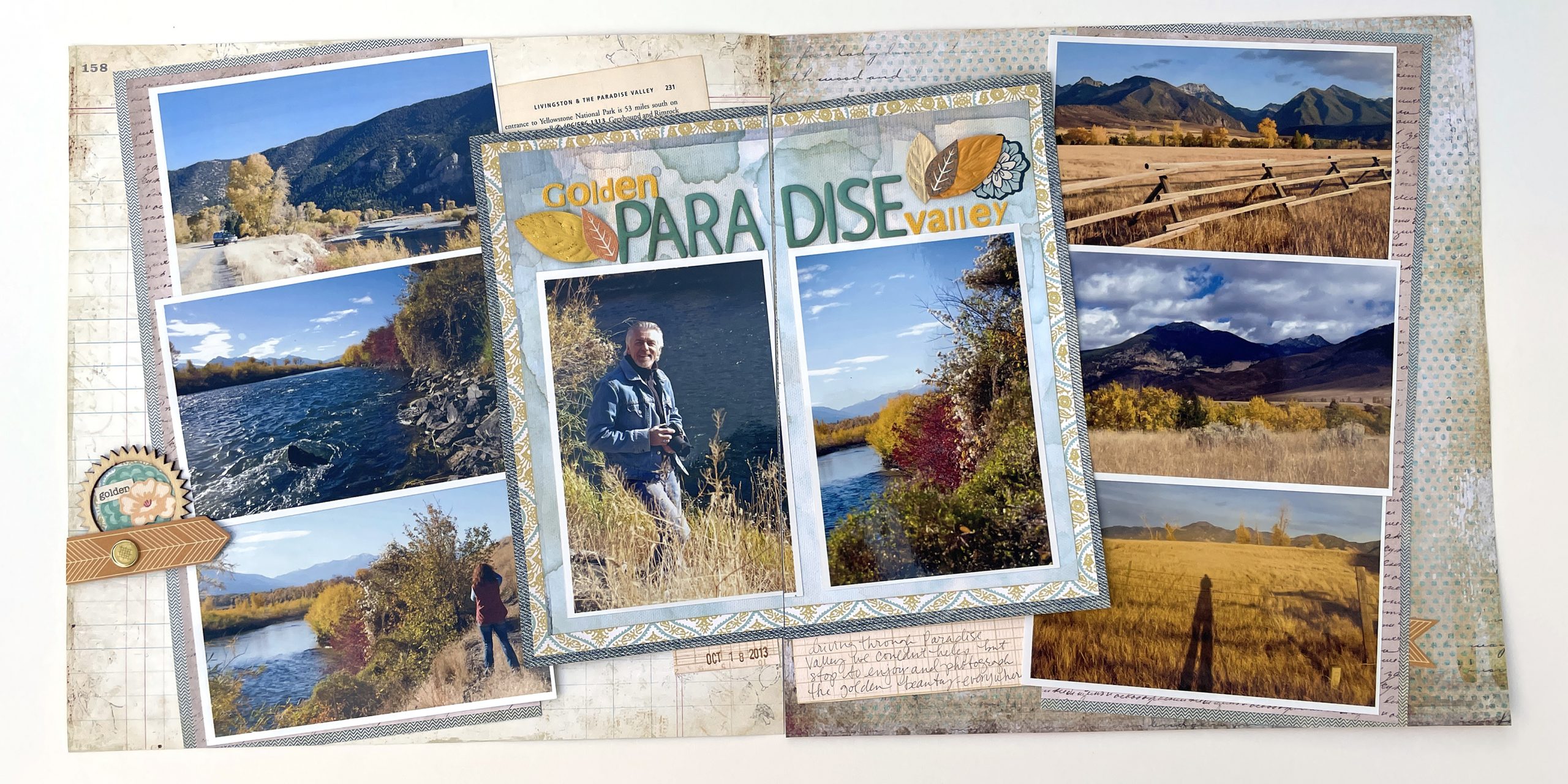
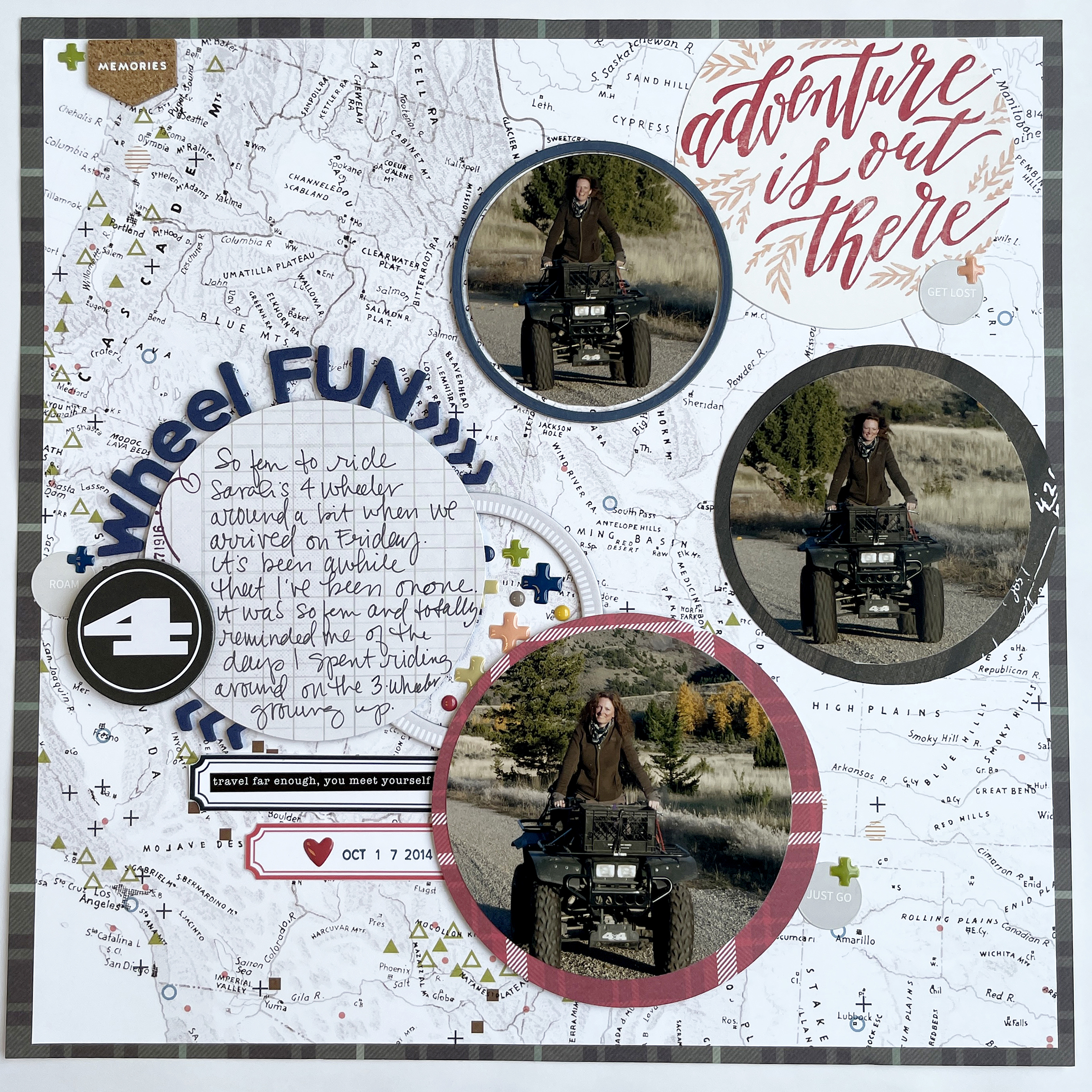
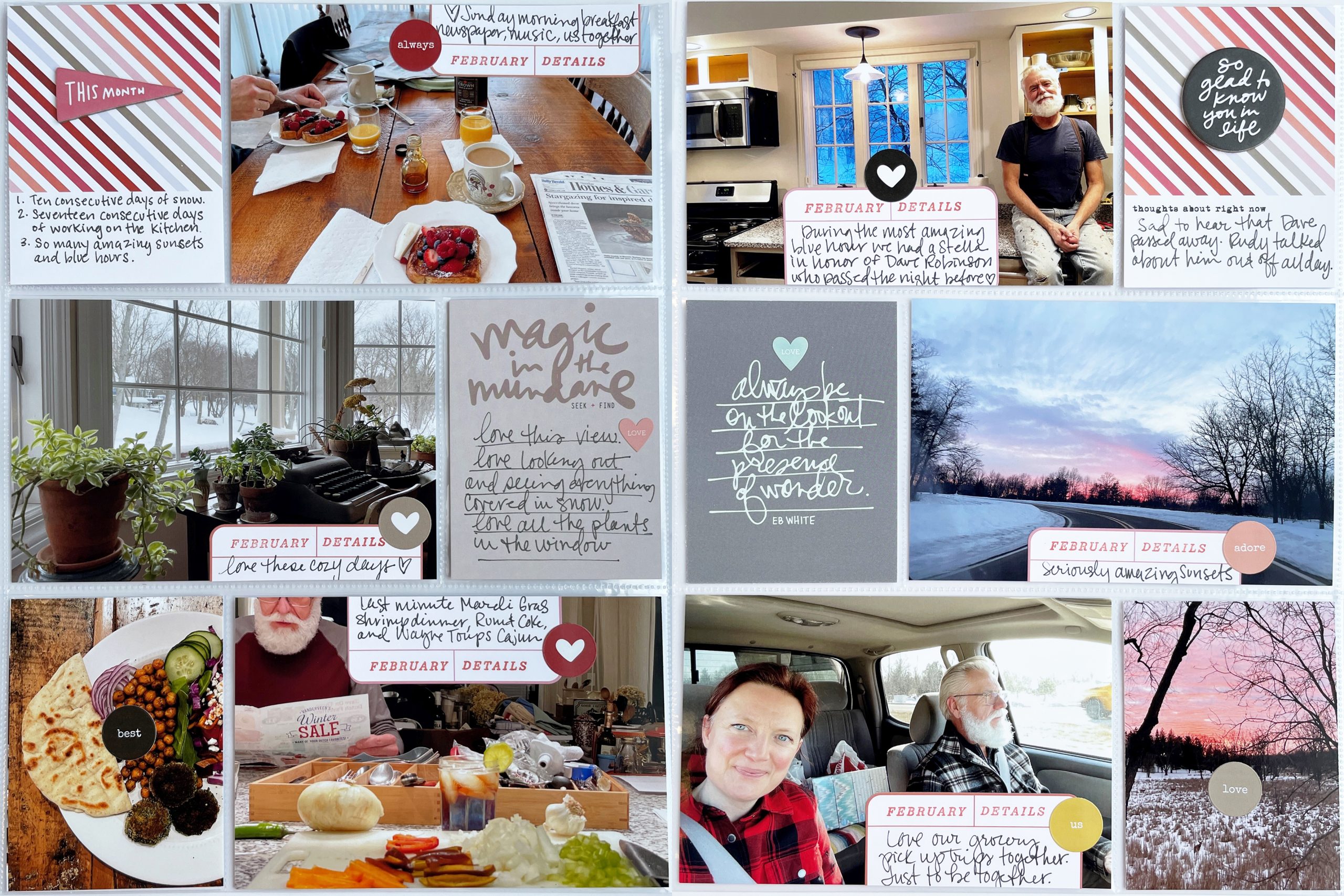
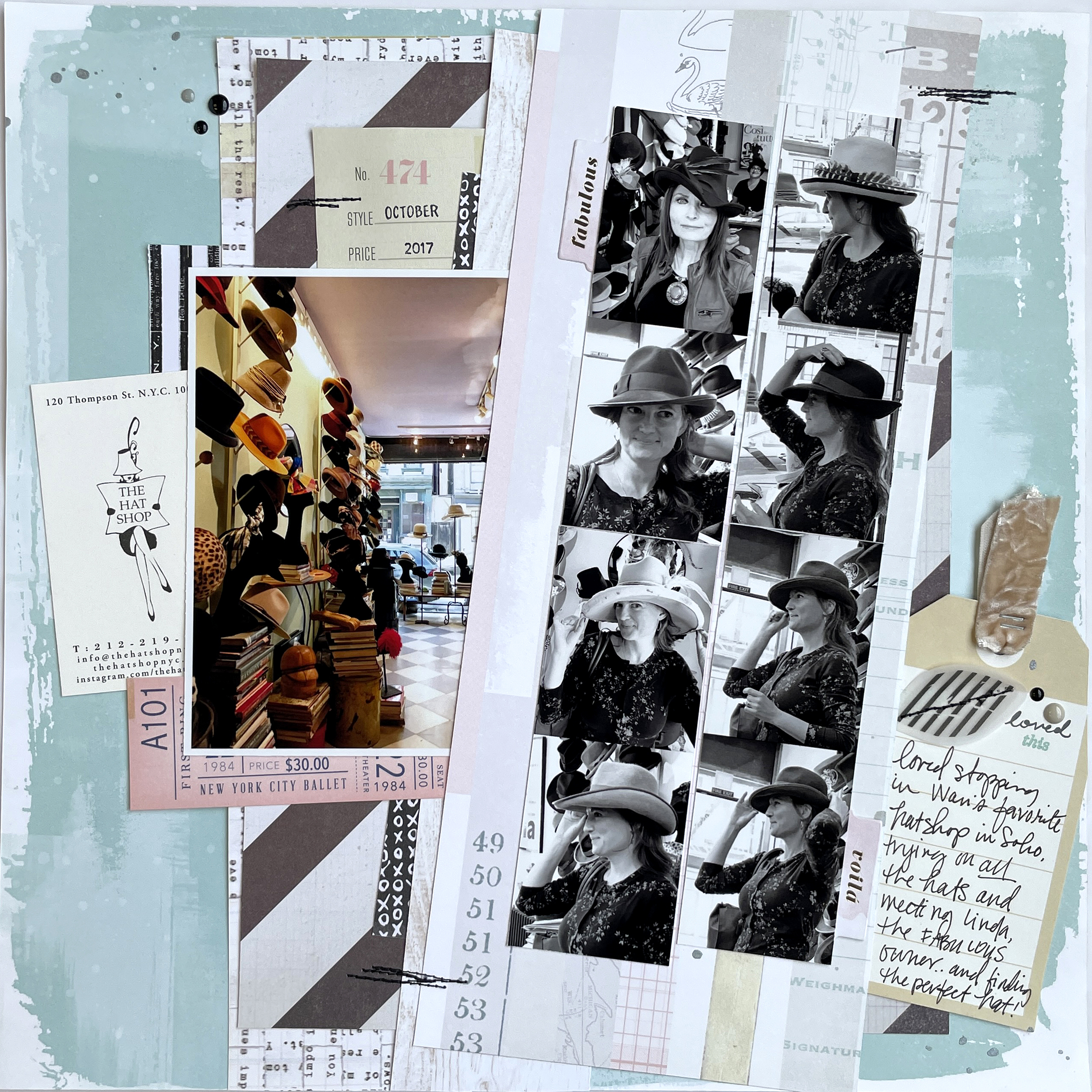
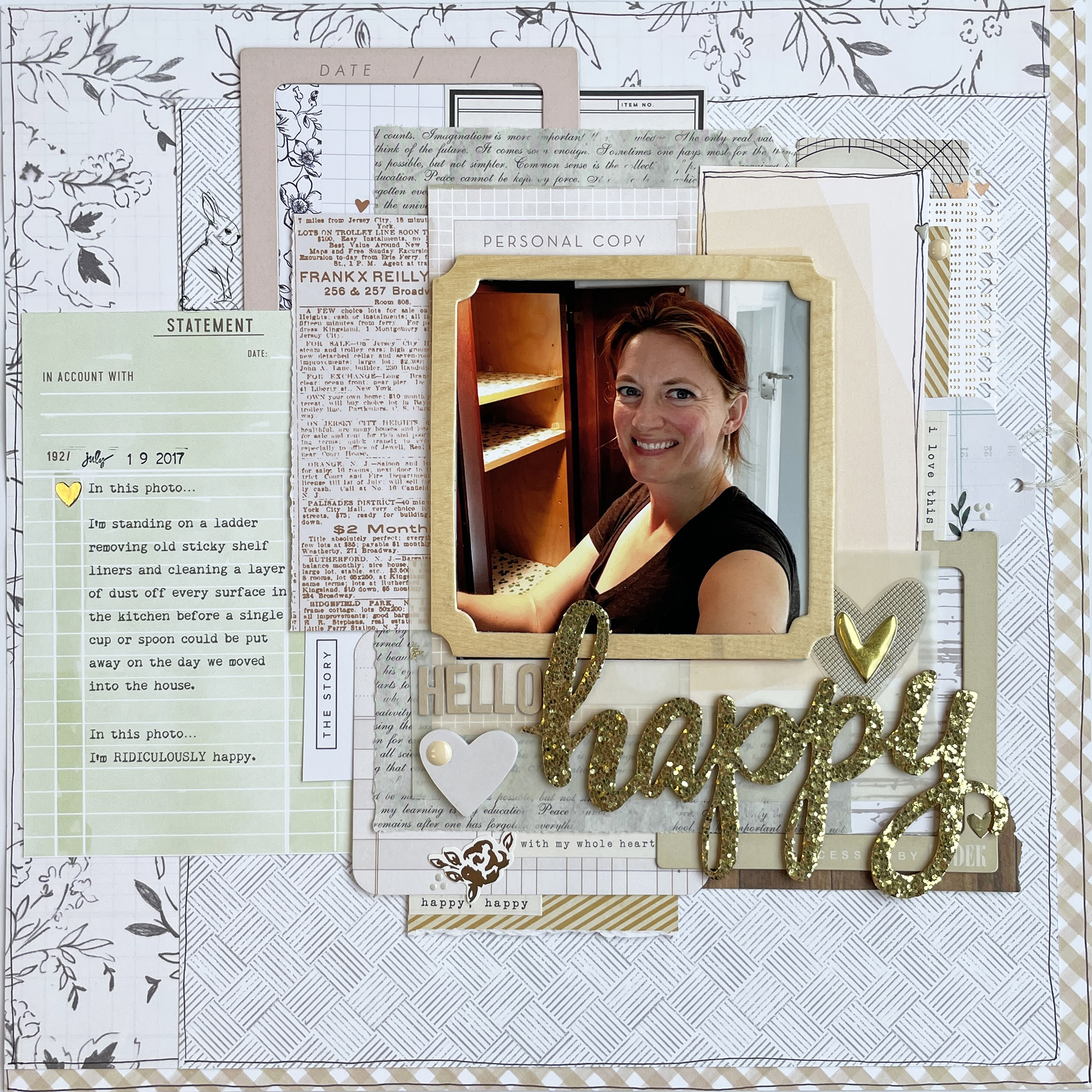
Links Mentioned
- 49 and Market Vintage Artistry Essentials (*)
- Free Bucket List worksheet
- The next Refresh retreat begins September 2.
- Helen on Instagram
- Join our Creative Community
* Affiliate link
Helen DeRam 0:00
I'll just start with whatever's exciting me the most at the time, it could be the middle of the trip. So I kind of go between having a framework and not, to take advantage of my momentum and my excitement.
Jennifer Wilson 0:15
Welcome to Scrapbook Your Way, the show that explores the breadth of ways to be a memory keeper today. I'm your host, Jennifer Wilson, owner of Simple Scrapper and author of The New Rules of Scrapbooking. This is Episode 130. In this episode, I'm joined by Helen DeRam to discuss an approach to album projects that helps her stay inspired from start to finish. Helen is also our keynote speaker at our upcoming Refresh Retreat, which begins September 2 for members.
Jennifer Wilson 0:50
Hey Helen, welcome to the podcast.
Helen DeRam 0:52
Hi, Jennifer. It's great to be here.
Jennifer Wilson 0:55
I am looking forward to our conversation because I get to work with you so much behind the scenes, but I want to kind of take things out to the public realm and share more about your process. But can you kick things off by sharing a little bit about yourself?
Helen DeRam 1:13
Sure. So my name is Helen de Ram. I'm an IT director by day. I live in Northern Illinois with my husband Rudy. We've been married for 11 years and together for 10 before that, I have an adult stepson named Kyle, he doesn't live with us. And I'm really close with my two sisters, Nancy and Jenny. And we try to get together whenever we can to scrapbook. And when I'm not scrapbooking, I enjoy antiquing and gardening, especially with native plants.
Jennifer Wilson 1:46
Ooh, so fun. Yeah. I love your overall kind of design sensibility and a lot of things that you're interested in. You're kind of like a role model for me in that regard, because I'm aspirational when it comes to decor and garden.
Helen DeRam 2:02
Well, thank you.
Jennifer Wilson 2:05
And yeah, and it's also super cool that you have family that scraps with you. That's that's very fun.
Helen DeRam 2:11
Yes, we try to you know, we, obviously last year was different. And summer's always hard. But we try to get together once a month to scrapbook. We were doing it over Zoom last year, which was, which was good. I was glad we were still getting together in that way to scrapbook. So...
Jennifer Wilson 2:28
Yeah. So what's one thing that's exciting you in the hobby right now.
Helen DeRam 2:33
So I have two things I want to mention. One is a product. And the company is 49 and Market. And they have a line called Vintage Artistry Essentials. And it's just kind of really cool vintagey vibe, which I used to do and kind of got away from. But I really kind of like it and it's very floral, and it has, you know a lot of butterflies on it. But it's got that vintage vibe. So it kind of works with, you know, my gardening stuff when I'm doing layouts about that. And then the other thing, I was inspired by the Photo Journey that we're doing right now at Simple Scrapper, and I jumped into Lightroom, the app. And so I have it on my phone and my husband's phone. And I have the desktop version, I also have the classic version. So I still have to figure out my flow. I do love the synching of photos. Just this past weekend, we did a little trip and I was able to you know, turn my computer on and it synced all the photos from both our phones, which is amazing.
Jennifer Wilson 3:44
It is amazing.
Helen DeRam 3:46
The only thing like that I have to figure out is, I really like in the desktop version where I can search by content, like, you know, flowers or cats or whatever. But you can't print from that version. So because I want to be able to use that search. So I have to figure out my flow still, but I'm definitely very excited about it.
Jennifer Wilson 4:06
Yes, you know, there are certainly like pros and cons between Lightroom and Lightroom classic. And, you know, there's certain features in one and other features in the other one. And you know, I actually have both installed right now. And when they first released them, there were there were issues but I I find them living harmoniously next to each other. So from that perspective, whatever photos you have synced, you can use the features of Lightroom that are a little bit more intelligent. And that's actually how I did all my facial tagging. And then because the facial tagging in Lightroom classic is so ridiculously slow and just basically crashes my computer. So there are there are things that we can do to give you back the best of both worlds. Okay,. I was curious when you mentioned that Vintagey collection, were you ever really into like like Tim Holtz stuff and doing tags and all of that? Because I see that aesthetic and the things that you enjoy, but I don't necessarily see that in your scrapbooking today.
Helen DeRam 5:10
Right, right. Yes, I was definitely into Tim Holtz. Like I still have my Distress Inks, I still haven't purchased any of the Oxides. But yeah, I was always like, you know, the brown edges and torn edges and kind of fit in with, you know a lot of what I was scrapbooking at the time. But I still yeah, I kind of like it. I feel like it's sort of coming back. Like I'm seeing more of vintagey stuff in products and what some people are doing. So...
Jennifer Wilson 5:43
Yeah, and maybe it's like there's, as it's coming back where everything when it cycles back, it's modernized, I see that even in the the youth clothing out there, they're, you know, they're taking what we were in the 90s. And I'm like, this is a little bit cooler than what we were in the 90s.
Helen DeRam 6:01
Right, right.
Jennifer Wilson 6:03
And so maybe, you know, things are as things come back around. And you know, for some that that that trend never left. But as things come back around, I think we see them in new ways and, and find ways of incorporating them into our current style of scrapbooking.
Helen DeRam 6:19
Yes, yeah, it does have a fresher vibe to it. So vintage, fresh vintage.
Jennifer Wilson 6:26
Yeah, I love that idea. Before we get into today's topic, I wanted to just talk a little bit about story. So we always love to hear from our guests about their Bucket List story. So these are stories that are a little bit more important to you a little bit deeper. They don't necessarily have to be serious, but they feel compelling. You really think this needs to be told, you know, before you quote unquote, kick the bucket. So what's one story on your list?
Helen DeRam 6:55
So one that I've been thinking about for a while is doing a seasons of us for my husband, Rudy and I. And to me, it's kind of it's kind of like a timeline thing, it's probably going to be two pages, with you know, a few pictures for each thing. And just kind of the different seasons that we've been through. You know, when we were first together, we both had motorcycles and we did a lot of motorcycle trips. And then we started going out west to dude ranches and we're doing that. And then he pursued his dream of becoming a fine art photographer and we started doing art shows every summer. And then a few years ago, we bought his house and you know, kind of really got into gardening and all that. So just the different seasons of our relationship and what we've done together. It's been on my list for a while so, I can see it.
Jennifer Wilson 7:47
That's so fun. And I love like I love hearing about some of the different things that you've done. And that evolvement over time. So, so many memories, for sure, I'm sure.
Helen DeRam 7:58
Yes, definitely. And that is definitely something that I needed Lightroom for to be back and find all those pictures.
Jennifer Wilson 8:06
Oh, yes, for sure. And, you know, so we've been right now, as of this recording, we're still in our Photos Journey. And we're transitioning towards our Projects Journey, which will begin in September. And that's what we're gonna talk about today. But during Photos, I just released the second half of our updated Photo Crush curriculum. And in part of this experience, and what we talked about is obviously the software and do you need some sort of software for managing your photos? And a lot of it ends up being just the ease of looking at things. Because yes, we can see things in folders. But oftentimes, you're opening and closing files sometimes just to see them or to do anything with them. But what the software can add is the ability to flip through images much, much quicker without opening and closing.
Helen DeRam 9:01
Yes, yes. I'm really hoping it's just going to make that process of finding the photos I want quicker, because, you know, as I'm doing more story type layouts or trying to do these Bucket List Stories. You know, just getting the photos can take much longer than it should.
Jennifer Wilson 9:20
Yeah.
Helen DeRam 9:20
So yeah, looking forward to using the app.
Jennifer Wilson 9:24
Awesome. So today, we're gonna talk about how how we get projects done, how can we break them down, and you're going to be our keynote speaker at our September Refresh Retreat, talking about travel projects. But today we're going to talk kind of more big picture about how you approach projects. So maybe just start by sharing kind of some of your current preferences, what are the format and sizes that you're creating?
Helen DeRam 9:51
I still do 12 by 12. I like that size a lot. I also do 6 by 8 and 9 by 12 is new, but I am using that I am enjoying it. And then for travel albums, I also do, like, I'll make my own mini albums, and sometimes even traveler's notebooks. I kind of kind of run the gamut.
Jennifer Wilson 10:12
Do you when you're trying to decide on what size? What are some of like the questions you're asking yourself.
Helen DeRam 10:21
For travel specifically, it's kind of the length of the trip, we were doing a lot of longer, like two week road trips. And for me, that's a 12 by 12, album, sometimes two. And depending on the number of photos, a smaller thing that I'll use, just a traveler's notebook, and then some projects like you know, December Daily, or Week in the Life, I like using the 6 by 8 size for that. So it's kind of a, you know, the length of the project and the number of pictures I have and the number of stories I want to tell.
Jennifer Wilson 10:57
Yeah, I know, sometimes for me, it's, it's it there's a, it's the balance between all the stuff you mentioned, and the creative freshness of it. Like how excited am I about this new shiny object?
Helen DeRam 11:11
Right, right.
Jennifer Wilson 11:14
So now I know you love pattern paper, and I'm curious, do all your projects whether we're talking about December Daily, Week in the Life, travel projects, whenever you're creating an album, is pattern paper, like always a design focal point for that, or is it only sometimes?
Helen DeRam 11:32
It's most of the time, for December Daily and Week in the Life, maybe a little bit less. I will still in December Daily, I will still buy, you know, pretty Christmas pattern paper and get it in there somehow. Because that's I think, that's like my biggest love of everything is pattern paper. So I do try to include it even if it's a little bit.
Jennifer Wilson 11:59
And what do you think you love about pattern paper? I'm curious, do you have a wallpaper in your house?
Helen DeRam 12:03
You know, I don't, mainly because my husband's like, we are never having wallpaper, just because of the different times we've had to take it down. I know it's easier these days. But, I don't know, I just have always loved pattern paper, like, I will just sit and look through my paper. And that gets me excited to scrapbook. And I, I like trying to find different patterns that go together. Or if I'm working on a particular layout, I'll look for a pattern or maybe it has an icon on it that somehow relates to the story or the photos. I like sort of like subtly making those things work together. It's just all about the pretty paper.
Jennifer Wilson 12:48
For sure. And I love that you know that about yourself, I think when we can hone in on the parts that really get us excited, that can help us maybe get out of a creative rut, or can even like help us make decisions easier. Like if you know, you're thinking about a travel album that you want pattern paper to be the star then maybe that's the supply that you choose first, and then you choose the rest of supplies based on what goes with that collection of pattern paper that you're going to use.
Helen DeRam 13:21
Yes, definitely, almost always.
Jennifer Wilson 13:26
So what types of projects maybe this year, you know, in terms of theme or subject matter, vave you been working on? Is it just the ones you've mentioned or have you done or not done other types of projects?
Helen DeRam 13:36
Well, I do sort of, you know, Project Life or a yearly album. It's a mix of pocket pages and layouts, and I'm trying to work on 2020 get that done and 2021. I'm sort of trying to do them in conjunction. I have a travel album I'm working on and then also from Simple Scrapper this year, though, Before Your Story. So yeah, I'm working on that as well.
Jennifer Wilson 14:03
And I'm curious, okay, with this project framework that I've given you how much has that been different or similar to the way you would approach a project or have you tweaked it to make it more fit the way you approach projects?
Helen DeRam 14:20
I'd say it's different, but I like it. I like for the Before Your Story because it spans, or could span such a large amount of time. And I love that you have a framework for it because I feel like I could get really lost in overthinking it. So it's been really good, you know, guideposts for me to kind of like, okay, I'm going to, you know, follow it along and then it'll help me get it done. It's a really different way for me to do a project but for this one, it's it's it's working out really well.
Jennifer Wilson 14:57
Awesome. I'm so glad to hear that. So what's your mindset around fishing? In terms of like, if we take the example of December Daily or Week in the Life where the, you know, the live period, the subject period of this album is during a certain time? Do you want to finish close to that time? Are you okay with letting it kind of staying unfinished and getting it done when when you can?
Helen DeRam 15:22
So for those two in particular, I want those done, quote, unquote, in season they're, they're very to me, like, they're, they're very, in the time. I want my journaling to be in the time. Usually for December Daily by like the end of January, I try to be done with it. You know, kind of, I love Christmas, don't get me wrong. But at some point, I, you know, I want it to be done. And I want to put it away and then wait for it to come around again. And same thing with Week in the Life that one I tend to take a little bit longer. You know, I can, I like to document first and then go back through and and get everything journaled and get my designing done. You know, so I might take two months on that. But both of those, they need to be done for me, I can't put them away and come back to them. Because I know I won't. It'll be months and months and months before I go back to them.
Jennifer Wilson 16:28
Now I'm curious, what are maybe some of the strategies that you use to make those projects finishable? Is it all like hustle, willpower and dedication? Or are they, do you think there's things that you do that make it that help you make sure that you can finish in the season?
Helen DeRam 16:45
I do have a little I mean, they're similar but different. So I try to have a little more structure with like with, Week in the Life, I'm doing all my documenting. And then I'm going through day by day and doing my printing, and getting all my printing done. Then I'm trying to do my journaling during the week, I definitely like to have my journaling be during the time. But I have more of a format to get those done. And it is, I won't, I won't put it, I won't stop working on it, I have to just keep working at it. I don't work on anything else. So that's I think, also part of my process to make sure that I get it done is to not to not stop until I finish.
Jennifer Wilson 17:34
So I would say, so during those times of the year, you're like you're very focused on that one project.
Helen DeRam 17:39
Yes.
Jennifer Wilson 17:41
And then the rest of the year, do you juggle multiple projects? Because you mentioned several that you've been working on? Like, how does that make you feel? And what's the balance that you maybe go for?
Helen DeRam 17:53
Yes, throughout the rest of the year, I do have multiple projects. And I like I like having multiple projects, you know, I like doing pocket pages and layouts. I like going back to an old travel album and working on that and then working on Before Your Story. So I like having them. I, they, it doesn't stress me out that they're not, quote unquote, finished. I like that I have so many projects that I can pick up and work on at any one time. So yeah, because I so I don't get too stuck in working on one thing. I like the variety.
Jennifer Wilson 18:31
I love that. And I think that's that's an important lesson there that there's going to be times of the year where you need to focus. And there's other times of the year where the best thing for you to stay motivated is to have options. And the fact that we can do both maybe is what can facilitate even more success and knowing you know what little mini season you're in at that moment.
Helen DeRam 18:56
Yes, definitely.
Jennifer Wilson 18:59
So how do you manage the plans and maybe kind of story prep for your project as you're getting ready to do to do a project and maybe this is primarily not December Daily or Week in Life, because that subject matter kind of unfolds before you. But if you you know you're no you are going to do a trip or you're going to do a certain period of time or a specific, you know, concept album, how would you prepare for it?
Helen DeRam 19:29
So, for the travel album, what I try to do, I don't really have a laid out plan before me necessarily. I try to prepare the things that for me need preparing and doing ahead of time. Like for me, it's the journaling and I like to do my journaling, as I'm doing something. So and I want to record not only what happened and what we did, but also how I felt about it. What were the great parts or some weird thing that happened. And then it's getting all the pictures done. And then I just kind of like to dive in and get started I, I get, I get excited about, you know, just kind of starting scrapbooking. And I'll just start with whatever's exciting me the most at the time, it could be the middle of the trip. And I just keep going and, and I use that momentum. And then I once I kind of get to a place where I have a certain amount down, I kind of look at what I've done and, and then figure out what still needs to be done. And then kind of build more of a framework and you know, kind of a list of okay, here's what's missing, here's what I still need to do. So I kind of go between having a framework and not, and I sort of mix the two together to to take advantage of my momentum and my excitement, if that makes sense.
Jennifer Wilson 20:59
Oh, yeah, it does. I think that sometimes we can. And I say this, because I'm guilty of it, you can over plan and never get started. So I think it sounds like you like to dive in and touch the materials and start working with it to figure out the plan. And then you can maybe improve, then you can maybe have repetition, or look for the gaps, and then figure out how you're going to then complete the album using, you know, what your creative brain has pulled together from all this stuff.
Helen DeRam 21:33
Right, right.
Jennifer Wilson 21:36
I think yeah, there's some there's a huge benefit in that and not trying to have all the answers before you get started.
Helen DeRam 21:43
Yes, just having a few helps.
Jennifer Wilson 21:46
Yeah. So for so many scrapbookers, I always hear about a roadblock of making decisions about what photos to use, and then print for a project if you're doing a physical album. Do you do you struggle with that? And you know, how do you make sure that that's not a barrier?
Helen DeRam 22:13
I do struggle with that. And I might, the best thing for me to do is just, and I'm not gonna say print all the photos, but almost. Like if it's, you know, I do some editing, like, I'll crop and I'll lighten things. I want, I still want all my pictures to look good. And that takes time. But I'm not, I try not to think too much about what's going to go on what page and what size it might be. It's just, let's get these edited, let's get them bulk printed, you know, and usually, if I'm doing that many I'll send them you know, to Persnickety or somewhere to get them printed. And then I get them back and then later if I think like, oh, I want this in a different size, or you know, maybe my editing wasn't so great, I'll then print at home, you know, to, for a few photos. Or if I miss something, but really my main thing is not thinking too much about it. And if I print more photos, then I'm going to use, I don't have a problem with that. It's just, I need to get that part done quickly so I can get to the next part. Because I don't want that to be my my bottleneck. And having a stack of photos in front of me is what helps.
Jennifer Wilson 23:32
Yeah, yeah, especially that's kind of your creative fodder for figuring out how this project is going to come together. So I like that balance between, you know, going ahead, printing probably more than you're going to need, and then still having that flexibility of printing at home. And so that also may be kind of balances some of the costs out too because you know, printing at home could be a little bit more expensive than then mail ordering in bulk. But you're also not, you're doing everything you need to to make sure this project is going to be started and move towards being finished. So I love that.
Helen DeRam 24:07
Yes, yeah. Kind of the best of both worlds.
Jennifer Wilson 24:11
Now I'm curious, do you find that the pre printing works better? Or is there no difference for pocket pages versus layouts?
Helen DeRam 24:27
Pre printing does work better. But I don't always do that push to get all my you know, for me, it's like, I want to do it all. Like so maybe I'll spend a week to get you know, select six months of photos and get them sent off and printed. But man that really sets me up nicely, you know, for a while and then I don't have to worry about you know, every time I sit down, oh gee, now I need to go through and you know, select my pictures and print my pictures and then I've spent my time doing that. So I do like that, better but I don't always do it.
Jennifer Wilson 25:08
I'm thinking more along the lines of when you're designing a page. So on a traditional layout, then you can either use the four by six, or you can crop it down. You know why it's why we call it cropping, right, you might cut some of those photos down. But with pocket pages we end up with for printing on four by six, sometimes those are not going to fit in a three by four pocket, even if you wanted to. So how do you how do you manage that? And that's what I was speaking of, in terms of ease. Are your projects, do they tend more towards layout type pages of whatever size, or more pockets?
Helen DeRam 25:49
I definitely do both. I, you know, there's kind of that, I heard it, I don't know when. Uou know, if you take the picture horizontally, make it a four by six. If you take the picture in, you know, vertically make it a three by four. So that's kind of like a loose rule.
Jennifer Wilson 26:11
Can I take credit for that idea? Because I know that I've said that.
Helen DeRam 26:14
Yes, yes, absolutely take credit for that. Because that was like a genius thing, really, because it's so simple. And so if I, you know, when I don't know, I do that, for sure. Because I don't often use that pocket page that does have the four by six vertical, you know, it's gonna be a vertical 3 by 4. And then if maybe, you know, I'm really cropping in on something that's small, make it a three by four. But yeah.
Jennifer Wilson 26:43
Okay. I love that strategy, so let's go with it.
Helen DeRam 26:46
Well now I know to give you credit.
Jennifer Wilson 26:49
Well, if somebody else wants to take credit, please let me know. Maybe I did hear from someone else. But I, I feel like that. I've said that for a number of years. And so yeah, it's an awesome strategy that I definitely use if I'm pre printing in batches and trying to make some decisions without knowing exactly where those photos are going to go on a page.
Helen DeRam 27:08
Right.
Jennifer Wilson 27:09
That's just an easy rule of thumb.
Helen DeRam 27:11
Definitely.
Jennifer Wilson 27:12
I think, especially for like, if you're doing weekly or monthly Project Life, and that's, that's your biggest hurdle is figuring out which orientation for which pocket, I think that can be a really helpful strategy.
Helen DeRam 27:24
Yep, for sure.
Jennifer Wilson 27:27
So we've talked about a variety of different projects, what do you think are some of the commonalities in your approaches, and maybe how, or sometimes you do things very different depending on the project.
Helen DeRam 27:39
So I think, you know, I try to document first and then sort of do. For, you know, those kinds of projects like December Daily, Week in the Life. Even, you know, a travel album. And for those, you know, some of those some commonalities are, you know, having that more fresh in the moment journaling. Where, you know, sort of my yearly album, even though I'm, I am documenting on my on an app, you know, journaling. I, because I'm doing it later, you know, I have a different perspective, my journaling is a little bit different. So, that's the way that it's different. For some projects, you know, I have a set of products, and I use those and maybe just add in a few things. For other things, like, you know, just a travel album, I'm just using whatever I have, I don't, you know, like, again, I start with the paper, and then kind of pull in things, I don't have a specific kit of products. So those are some of the similarities and the differences.
Jennifer Wilson 28:57
When you're starting a travel project, do you go and seek some fun things that are going to be for this project? Or do you, are you tending to, you're just kind of gathering items from your stash that you think will work?
Helen DeRam 29:12
I definitely seek some new fresh things, right, because that's exciting to have new product. So I definitely do that. And then, but I always kind of mix in things that I already have as well.
Jennifer Wilson 29:25
And when you are traveling, do you tend to kind of do that documentation on the road?
Helen DeRam 29:31
I do. I definitely do. So I have a journal that I bring with me and sometimes that journal becomes my album and sometimes the journal is the just the journal or reference for doing a scrapbook later.
Jennifer Wilson 29:47
Oh, I love that. I love that you have the flexibility depending on maybe your creative inspirations but no matter what, you have some documentation.
Helen DeRam 29:56
Yes, that's that's really the you know, for me the most important part of the, of the trip is the journaling. And it's, it can be hard to at the end of the day or the beginning of the next day, or whatever it is, you know, I try to really keep close. Because when you're, you know, when you're on vacation, you're doing stuff. We do anyway, like a lot of things in a day. And then by the mid the next day, you're like, what did we do yesterday? I don't even remember. So yeah, try to really keep on top of it.
Jennifer Wilson 30:30
Oh, and I love the point that you made about the perspective and your journaling and, and maybe kind of going into a memory making experience with an awareness of okay, I really want my, my journaling and my stories to this to be in the moment, or I want this to be reflective. Now, obviously, when we're talking about past events, we're always going to be reflective. Because I'm thinking particularly of I have this little traveler's notebook I've been working on for a 2001 trip to Paris with my parents. And you know, I had no documentation from that time, I didn't even even if I had any kind of digital device back, then I would have not had that anymore. I don't even know what would have been like a flip phone, right. And I didn't, I didn't have a journal. And so it's all just reflective of like, here's what I remember, and you know, where this trip fits in the scheme of my memories. And sometimes that's what we have. But if we have that just awareness, acknowledgement going forward, we can make better choices about Okay, I need to, to document on the road. And maybe I need to get this project done quickly after because time does keep marching. And very soon it will become a fast reflective memory to the current one.
Helen DeRam 31:50
Right, right.
Jennifer Wilson 31:51
Have you ever had any experiences where you wish you had documented more in the moment? Or do you feel like maybe that's just one of your strengths? Is that you, you tend to do that?
Helen DeRam 32:02
Um, you know, when I was doing the, or I am working on the Before Your Story, you know, and like you said, you know, even in 2001, we certainly didn't have any kind of, you know, phone to document anything. And going back even farther, we certainly didn't, um, you know, so I, and I feel like, my memory from, you know, teenage years and early adulthood is, you know, not so great. And I wish I would have done more documenting. And, you know, I guess that's easy to say, when you're looking back, I have some, but I wish I had more to fill in.
Jennifer Wilson 32:44
Yeah.
Helen DeRam 32:45
A lot of the little details.
Jennifer Wilson 32:48
Last month, I was reading some pages from my seventh grade diary, which was very scary.
Helen DeRam 32:56
That's fun, and probably a little cringe worthy.
Jennifer Wilson 33:00
Yes, it was like, This boy asked this girl to the dance, and oh my gosh, my life is over.
Helen DeRam 33:09
Yeah, I have. I have like a big box full of letters. Like I wrote a lot of letters back and forth, my best friend, at the time she lived here and also in New York. So we wrote letters. And so I have all of her letters, and you know, all the notes, we passed in class and stuff. And I was going through those and that actually fills in a lot of what was going on, at least from one side. So...
Jennifer Wilson 33:37
I love that. I love that. So next month, you're going to be kicking off our Refresh Retreat with a keynote presentation. As I mentioned, we're talking you go into more details on your travel project experiences and approaches and, and sharing more what they look like. But can you maybe give us an overview or some highlights of how you would say you approach travel projects?
Helen DeRam 34:00
Yes, so, you know, it is that sort of documenting and collecting while you're on the road or while you're traveling. And then when you get back, kind of doing a little hustle, right to get, get things sort of set up for you so you can get going. You know, printing your photos, selecting, getting that done, and then using that excitement and that that momentum to to get started and, and don't feel like you, you don't necessarily have to have the whole thing figured out. Like you know, I'm going to use this, you know, layout or this design. Just get started. Use your excitement and get going and then you can kind of make it fit into a framework as as you have already started. I think it's kind have a balance between having a plan and a framework and, and, and just kind of using your creativity and, and getting pages done and, and, and getting it going. So...
Jennifer Wilson 35:14
Yeah, and I'm really just trying to celebrate the memories of that travel experience. You know, whatever I've done these types of projects, I think there's some of the most fun because it really is a reliving of that experience, whether it's, you know, recent or far past. So I definitely love those. And I think a lot of folks maybe have maybe done a little bit more traveling this summer, even if it was just to like an Airbnb, or maybe have those past travels that they still want to document. So I think this will be a fun way to kick off our retreat.
Helen DeRam 35:48
Yes, I am looking forward to it.
Jennifer Wilson 35:50
Well we will also include a couple sample images of your your regular projects and your travel projects in the show notes for this episode, because we can't capture in audio format is just how beautiful your work is. And so I want to make sure our all of our listeners get a sense of that.
Helen DeRam 36:09
Thank you.
Jennifer Wilson 36:12
All right, can you share where folks can follow you online and you know, anything else that you are have coming up in the future?
Helen DeRam 36:20
Sure. So I'm really just on Instagram, and I'm hderam, hderam, there and I share some of my pages and my gardening, some antiquing. And you know, if you're a Simple Scrapper, remember, you can see my layouts in the Spark magazine, which I love contributing to and then the upcoming travel presentation.
Jennifer Wilson 36:49
Yes, and we also must give you credit for being the one that ensures that we give transcripts for all of our episodes. So I hope that those of you who have found that helpful will let us know if you're enjoying them. We wanted to both do this for those who needed it for accessibility purposes, as well as those who just wanted to have that extra just that extra experience because I've heard from from several listeners who said they really enjoy reading the transcript as they're listening to the episode and they find that adds to the experience. So you can find those transcripts on the show notes page for the episode. So for this episode, that will be simplescrapper.com/syw130. Well, thanks so much for spending time with me, Helen.
Helen DeRam 37:37
Thank you, Jennifer. It's been so much fun, it's an honor.
Jennifer Wilson 37:42
And to all of our listeners, please remember that you have permission to Scrapbook Your Way. If you like the podcast, you'll love being a member. When you join you'll get access to weekly Zoom crops, bimonthly retreats, and a huge content library. You can head over to simplescrapper.com/membership to learn more and join our creative community.
Sign up to receive email updates
Enter your name and email address below and I'll send you periodic updates about the podcast.
How to Subscribe
The best way to listen to Scrapbook Your Way is with a podcast player on your mobile device or with iTunes on your computer. You can subscribe via Apple Podcasts, Google Podcasts, or by searching for “Scrapbook Your Way” in your favorite podcast player in order to receive new episodes automatically.
If you’re enjoying the podcast, we’d love if you left a review on iTunes.
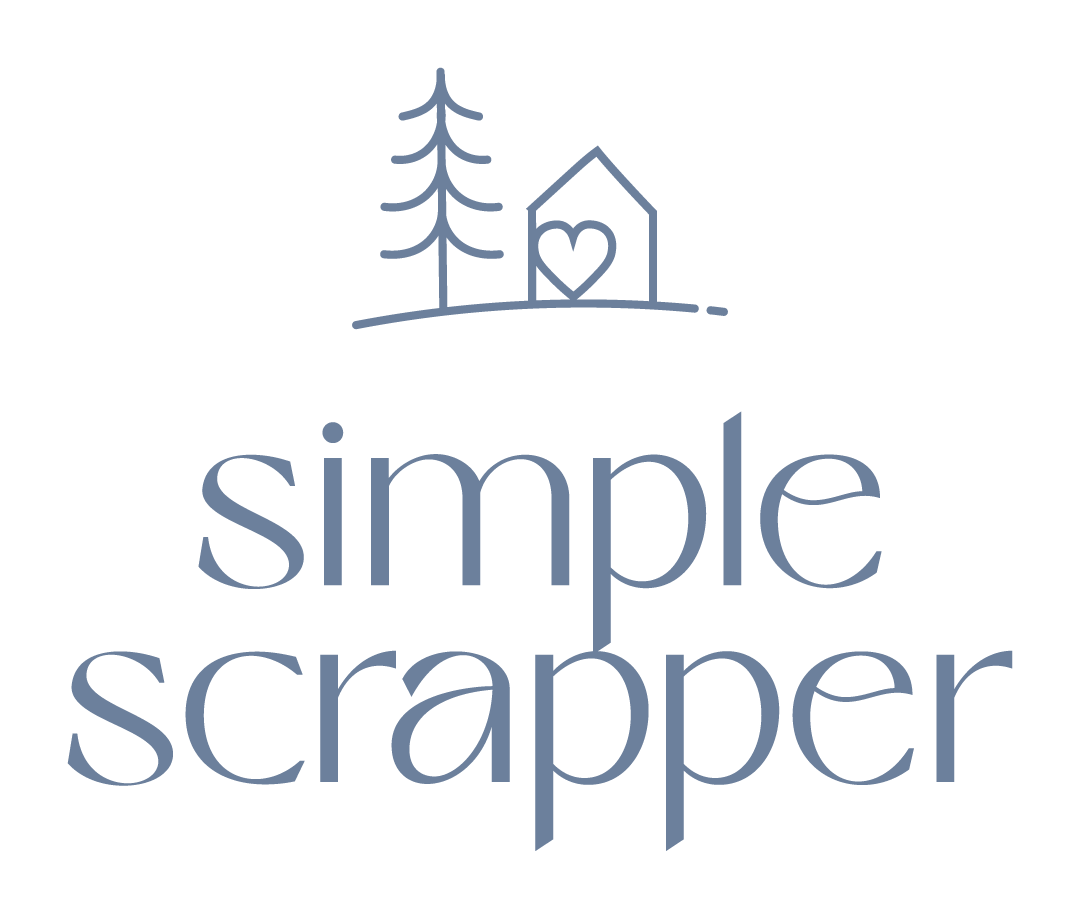
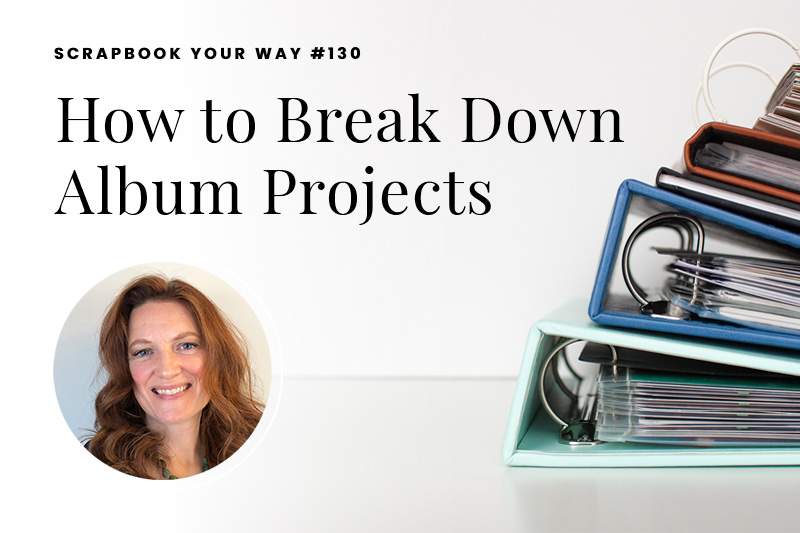
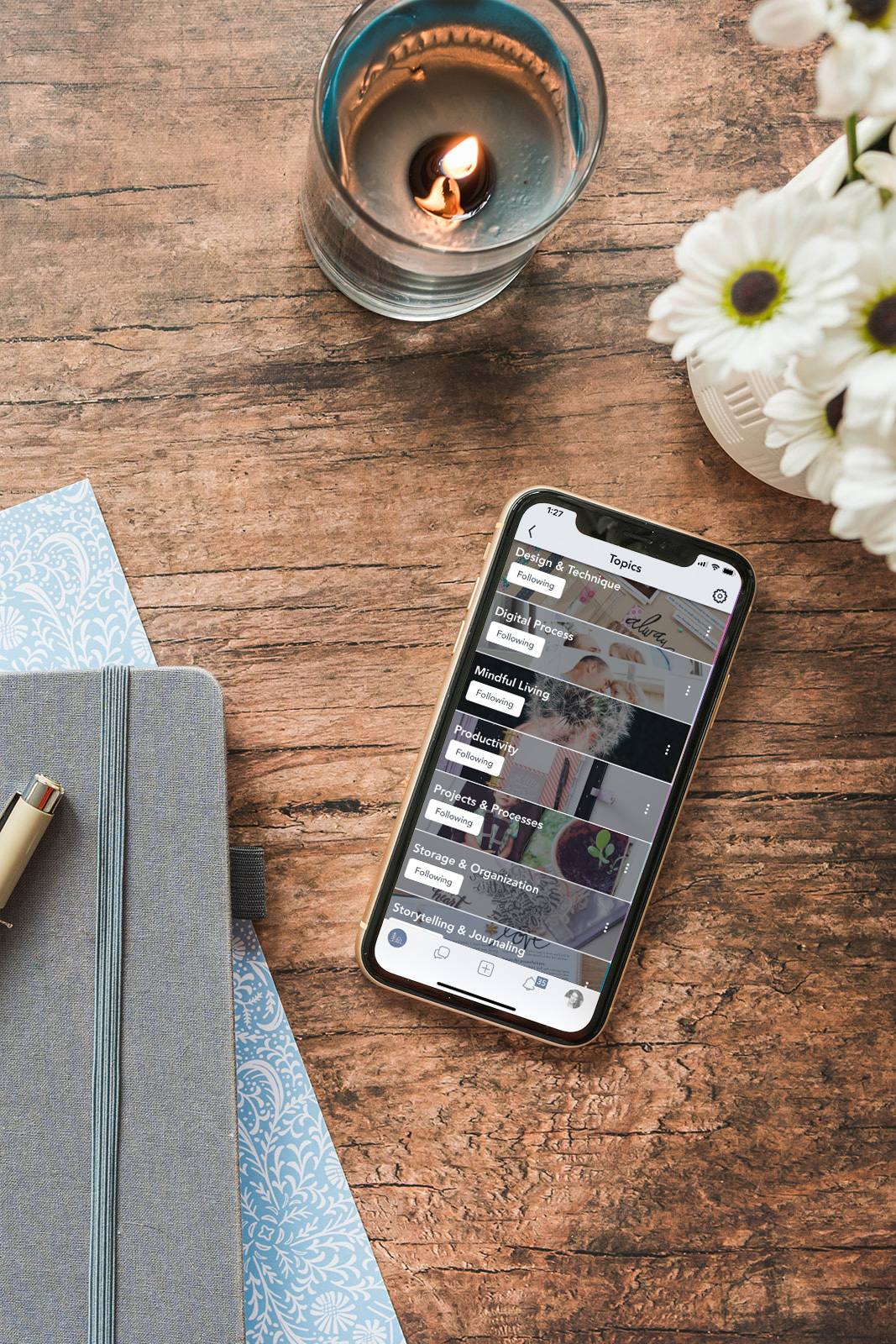
0 Comments